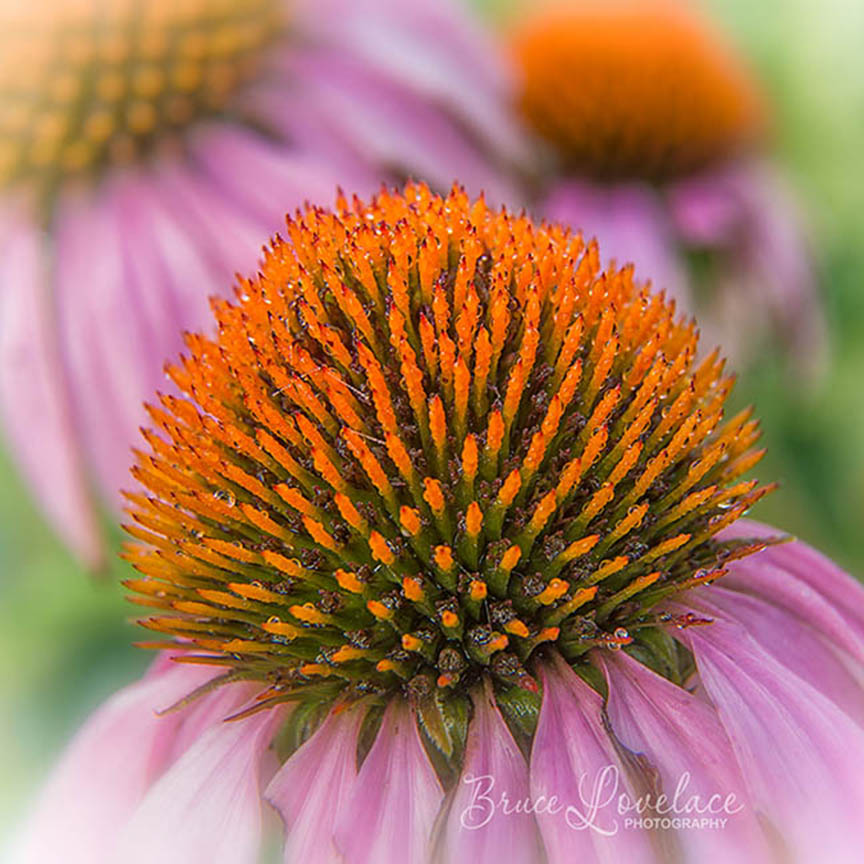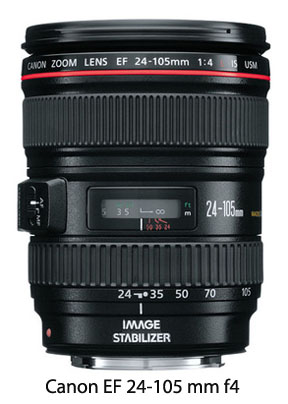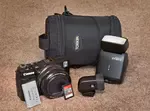The Canon 24-105 Lens
You want to know more about the Canon 24-105 lens? I'm sure you're wondering if the 24-105mm f/4 lens is any good, and what type of photography is the 24-105 lens good for. This post will answer your questions as well as give you some key factors to help you decide if it's a good fit for you.
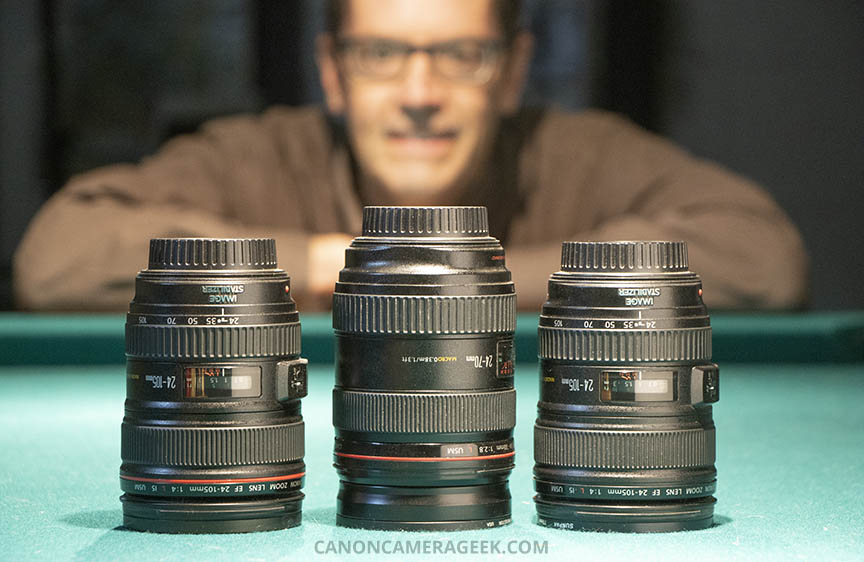 Me and my Canon 24-70mm lens sandwiched between my two 24-105mm lenses.
Me and my Canon 24-70mm lens sandwiched between my two 24-105mm lenses.At first glance you might think that the 24-105 lens would be a better choice over the Canon 24-70. It was for me, but the 24-70 f/2.8 is preferred over the 24-105 f/4.0 lenses versions by many wedding photographers.
Shockingly, at the time of this post, I have both. That's two copies of the 24-105mm f/4.0 and an older version of the 24-70 f/2.8. But you already know I'm a Canon Geek.
Why wouldn't you want the longer zoom range and less weight when you look at these two professional mid-range zoom lenses made by Canon. For my money,
The Canon EF 24-105mm f4 IS can easily be considered the best overall full frame Canon lens to have. The 24-105 is a great general purpose lens.
24-105 lens Full Frame compatibility
The 24-105mm lens is an EF lens, intended for full frame Canons, like the 5D, 6D, 1D, and R series of cameras, but it is fully compatible with the smaller APS-C cameras that are usually paired up with EF-S lenses.
On full frame Canon camera bodies its zoom range goes from a real nice wide angle (24mm) to a medium telephoto (105mm) with an easy twist of the wrist. On the smaller APS-C crop sensor camera, this lens has the angle of view of a 38-168mm lens. That gives you more telephoto power but less wide angle capabilities.
NOTE: The newer mirrorless "R" cameras work with RF lenses too and that Canon now has three RF 24-105mm lenses. Here' the article doing a RF 24-105mm lens comparison of the three and here is why the RF 24-105mm f/4-7.1 version is such a good value.
how fast is the 24-105 lens
The Canon 24-105 f/4 lenses are moderately fast. Although f4 is by no mean considered real "fast," with today's high ISO sensors and processors you still can shoot without flash in many low-light situations and not be bothered by the noise levels. This lens holds the maximum aperture of f/4 throughout the zoom range.
The f/3.5-5.6 IS STM "kit" lens version of the 24-105 mm lens is 1/3 stop faster (f/3.5) at 24mm, but 1 full stop slower (f/5.6) at its 105mm focal length.
The 24-105 mm f/4.0 lens is not a "great" lens for nighttime sky photography, but I've used it many times for shooting photos at night. See the example below. Lenses that are f/2.0 or faster would be better choices.
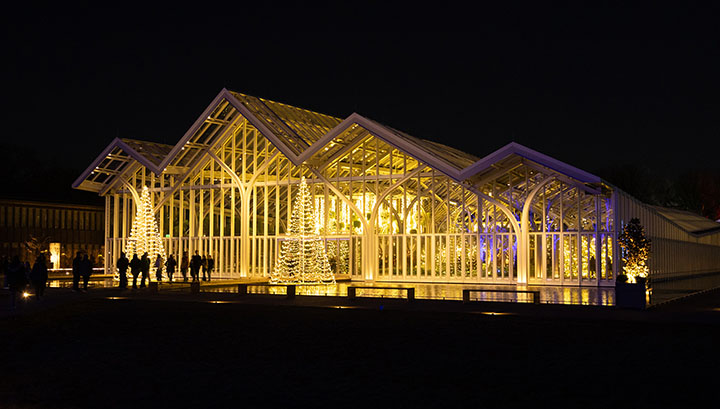 "Longwood Gardens at Night
"Longwood Gardens at NightRF 24-105 lens @ f/4.5 and 35mm.
Exposure was 1/13 second with ISO of 4,000.
See more of the night time photos shot with my RF 24-105 lens for Canon mirrorless in my post about Longwood Gardens.
In all the shoots I've done over the last 10 years, I can't remember saying to myself "I wish I had the faster 24-70 f/2.8 lens on my camera right now."
This is the lens that stays on my camera year round, except when I am heading out to do a senior portrait sessions or business headshots when I rely on my Canon 70-200 f2.8.
The Canon 24-105 lens is part of the Canon "L" series that comes with the traditional quality design, manufacturing and performance levels.
I personally think the lens has a great balanced feel to it as I typically hold my lens in my left hand in between shots during a typical photo shoot.
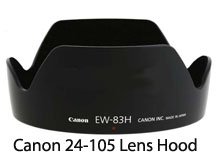
My biggest peeve is the same as other similar zoom lenses. I don't like the short petal-shaped lens hoods. I never have like the lens hood, but the 24-105 lens does have a decent list of good accessories.
I often shoot portraits with backlighting and the lens hood simply does not prevent sunlight from striking my lens when the angle of the sun is bad.
The two solutions to this little annoyance: (1) buy a collapsible hood and (2) rubber band a small black light-blocker to the petal-shaped lens hood.
If you want the lens size specifics, it measures 3.3 inches in diameter, is 4.2 inches tall and weighs in at just under 11/2 pounds.
Canon 24-105 lens zoom range
Here are two photos comparing the view at 105mm and the view at 24mm setting of the same scenery. You can see that the Canon EF 24-105mm f/4 L IS USM Lens zoom range is pretty significant.
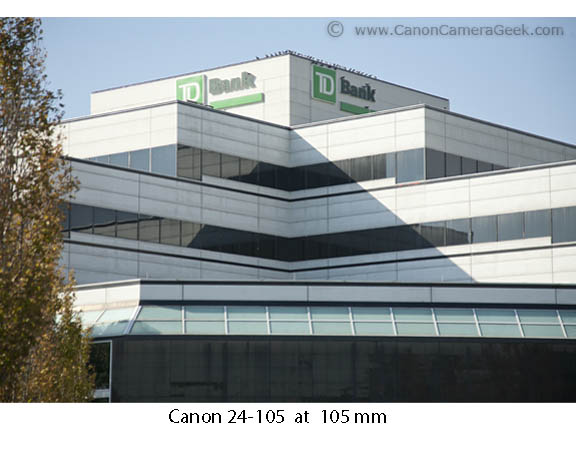 The photo above is taken at a 105mm lens setting.
The photo above is taken at a 105mm lens setting.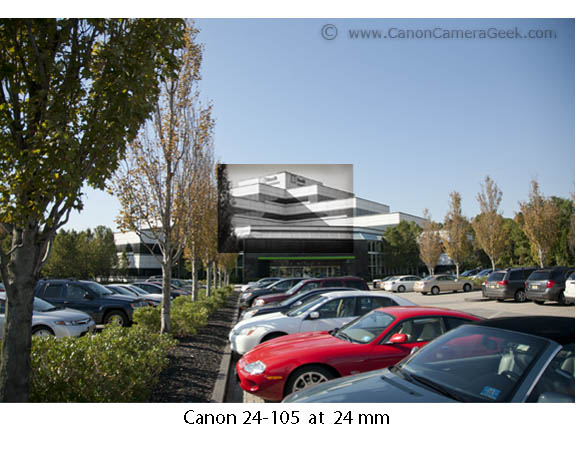 The photo above is taken at a 24mm lens setting at the exact same spot
The photo above is taken at a 24mm lens setting at the exact same spotin the parking lot as the fully zoomed in the previous example.
You can see that there is a bit of vignetting in the upper right corner. Both of these photos were shot at f5. The bottom image includes a black and white insert, superimposed in the middle of the example, to show you the coverage from the 105mm lens setting.
The 24-105 f4 takes a 77mm filter which matches several of the other Canon camera lens. It is not an inexpensive lens, but if you could have only one lens available to use, this would be the best Canon camera lens to get.
If you have to really watch your spending, you might consider the affordable and versatile Canon 28-135 zoom lens as your best Canon camera lens option.
If you are looking for something that can go a little wider, try the Canon 17-40 super wide-angle zoom lens. If you are looking for a free download of the Canon 24-105 lens manual here is the link:
If you're interested in looking at the Product information sheet: Right-click to download the PDF for the Canon 24-105.How to use the Canon 24-105 lens
his easy-to-use standard zoom lens can cover a large zoom area ranging from 24mm wide-angle to 105mm portrait-length telephoto, and its Image Stabilizer Technology steadies camera shake up to three stops.
Canon shooters like to know what is the 24-105mm lens good for.
The best feature of the Canon EF 240195 F/4.0 L IS lens is its versatility. With a 5x zoom range from 24-105, this lens will go from a 24mm wide angle to a 105mm telephoto and handle a large range of subjects. The added feature of having image stabilization eliminates camera shake for up to 3 stops.
I've used my Canon 24-105 for shooting portraits and weddings, macro photography, and landscape photos like the one below. It's also a great lens for family snapshots, family events, and taking when you travel on vacation.
1. landscape photography
 "Good Morning Maine"
"Good Morning Maine"Near Schooner Head, Acadia, Maine
Canon EF 24-105mm f/4.0 L IS Lens set to widest angle of 24mm
The Canon 24-105mm f/4 goes wide enough to handle most landscape photography situations. Pro landscape photographers will tell you you need extreme wide angle focal lengths to get those epic shots, but the 24-105 is still quite capable for this kind of photography.
2. macro photography
You also want to know is the lens good for macro. Yes, the Canon 24-105 f/4.0 lens is good for macro. There is nothing as good as a true macro lens, like Canon 100mm f/2.8 Macro lens, but the 24-105 will give you a close focusing distance, enabling flower photography like the one below.
The Canon 24-105 is not a dedicated macro lens capable of getting a 1:1 magnification, but it is capable of close focusing. To get even closer to subjects you can just add an extension tube or just crop in closer using any basic photo editing software.
3. Portrait photography
The 24-105 lens is a great lens for shooting portraits. The 4x zoom range makes it east to adjust and try a few different compositions and combinations to get just the right pose like the sample photo below.
You can photograph large group photos with the lens set at 24mm and you can get nice closely composed head shots with the lens zoomed all the way in to 105mm.
The 24-105mm lens is also versatile enough to shoot weddings, smaller family portraits, close up head shot portraits, Holy Communion photography, high school senior portraits, and beach portraits.
 Headshot: lens at 96mm
Headshot: lens at 96mm Group pose: lens at 32mm
Group pose: lens at 32mmI like to use my 24-105 in situations like the above where I know I'm be shooting close-up portraits as well as large group poses. When I'm only photographing small groups and head shots I'll switch over to using my 70-200mm f/2.8 as my preferred portrait lens.
IS IT FAST ENOUGH. One other questions you might be asking: is f/4.0 good enough for portraits. Is that aperture going to give you a nice blurry background? Yes, f/4 will give you a good amount of background IF you're using your 24-105 lens at its strongest telephoto setting of 105mm.
An aperture of f/4 is not ideal for low light situations, but it is adequate in most portrait sessions using available light, provided you elevate your ISO setting moderately.
As an Amazon affiliate Canon Camera Geek receives a small commission from qualifying purchases, at NO added cost to you.
Lens weather sealing
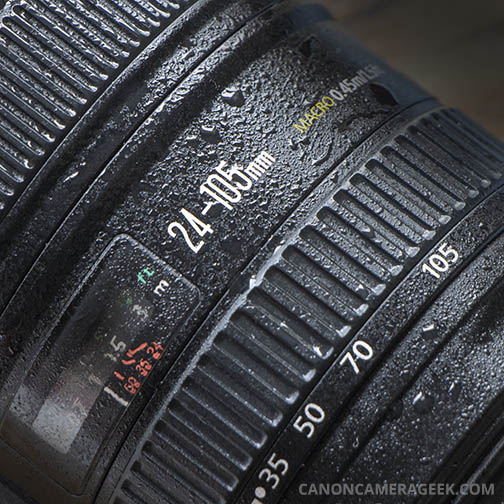 Weather sealed Canon 24-105
Weather sealed Canon 24-105Many photographers who are considering buying a Canon 24-105 want to know if it's weather sealed. The Canon 24-105 f/4.0 lens has weather sealing.
Although it's not fully waterproof, the weather sealing is a must have feature for photographers who want to be out in the weather. Some of the best landscape photos are taken during less-than-perfect weather conditions.
As an example, when I came across these deer frolicking at a local park during a windy, wet snowstorm, I appreciated having a weather sealed lens attached to my camera.
I zoomed in to 105mm which was almost enough power to get the composition I wanted. I cropped it to a square format to post on my Instagram account.
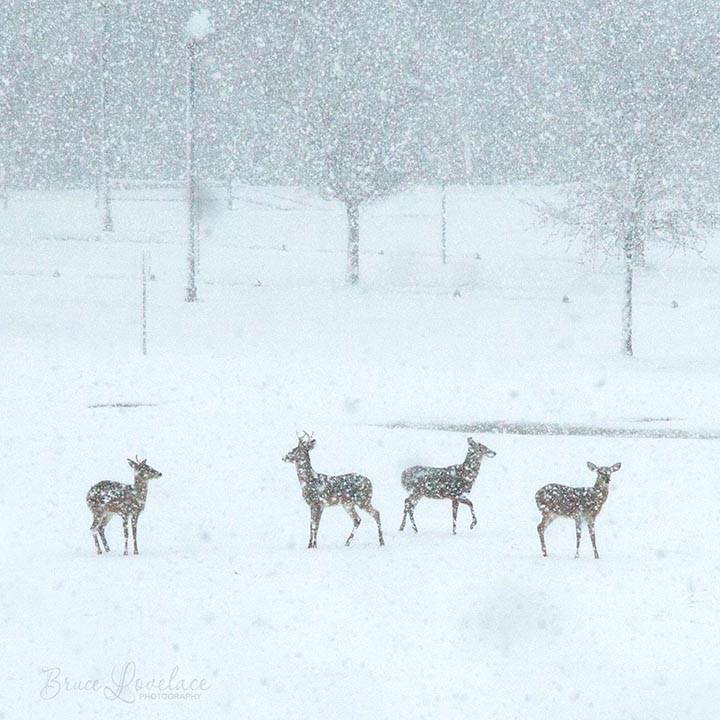 The weather sealing on the 24-105 was great to have for this photo.
The weather sealing on the 24-105 was great to have for this photo.Canon 5D Mark III, 24-105 lens @ 105mm, f/7.1, 1/1250 second, ISo 800.
Canon 24-105mm lens weight
How heavy is the lens The Canon 24-105 weighs between 11/6 lbs. and 13/4 lbs., depending on which version of the 24-105 mm lens you're asking about. That's about the same as 5 D sized batteries. See the table below for the weight of the Canon EF 24-105mm Lens, as well as the release date.
| CANON 24-105 LENS VERSION | 24-105mm f/4.0L IS | 24-105mm f/3.5-5.6 | 24-105mm f/4.0L IS II | Release Date | 2005 | 2014 | 2016 |
| Weight | 24 Ounces | 18.5 Ounces | 28 Ounces |
You can see that the most recently released version of the Canon 24-105mm lens is the heaviest, although it's only 17% heavier than the original 24-105mm f/4.0 lens. How much the 24-105mm lens is a concern for some photographers who need to travel lightly.
In the table above you can also see when each version of the EF 24-105mm lens came out. Fortunately, lenses don't become outdated as fast as cameras and the three different versions of the 24-105 lenses all benefit from having modern lens designs.
Final Canon 24-105 Lens Comments
This is a well designed and well-made lens. It is attached to my camera more than any of the other Canon lenses I own. I bought a second one because I need a back-up as a professional portrait and event photographer. I bought the 24-70 f/2.8 to test it for the Canon Geek readers.
The 24-70 lens is the preferred lens of many Canon wedding photographers (not me) because of its extra full stop of speed of f/2.8 versus f/4.0. I prefer the 5x zoom of the 24-105 lens over the 2.5x zoom of the 28-70 lens.
The 24-105 is very sharp, even at f/4.0. Lens tests reveal that the sharpest aperture, the sweet spot for the Canon 24-105 is f/8, although it's only marginally sharper because it's already sharp at f/4.0. Like most lenses, sharpness is usually the best about 2 f/stops closed from wide open.
It's the perfect weight and balance for the larger Canon full frame DSLR camera bodies like the 5D series that I use. I've never felt like the maximum aperture of f/4 has limited me, although if you really want the ultimate in bokeh, you would want to go with something faster.
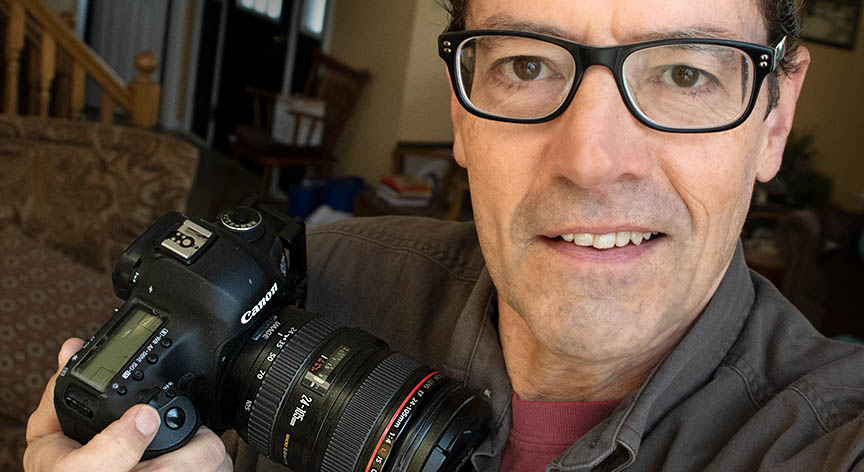 The Canon 24-105 lens is a great general purpose zoom lens
The Canon 24-105 lens is a great general purpose zoom lensthat can handle most photography situations.
I've only noticed mild chromatic aberrations with a wide-open aperture at a wide-angle setting combined with a high contrast situation and I corrected that the appropriate filter in Photoshop.
This is a very versatile lens and can be used for many different purposes. Here are several more Canon EF 24-105mm Photos.
I hope this article on the Canon 24-105 lens was helpful. Use the search box below to explore posts on other Canon lenses or use choose one of the related 24-105 mm lens articles listed below my signature.
Stay inspired. Shoot a Canon!
Search for articles on this Site:


Bruce Lovelace is the publisher of Canon Camera Geek. Read more about him on the About Page. He also publishes how to articles and camera gear reviews at the Photography Tips website.
View some of Bruce's photos on Instagram and Flickr. Join the tribe of followers on YouTube. Bruce also runs photo workshops and provides 1 on 1 digital photography coaching.
As an Amazon affiliate Canon Camera Geek receives a small commission from qualifying purchases, at NO added cost to you.
Search for articles on this Site:
Recent Articles
-
Canon Camera Guide. Useful Advice on Canon Cameras-Lenses-Accessories
Jan 01, 26 03:43 PM
Helpful advice on Canon Cameras, Canon lenses, and Canon camera accessories. Answers to your questions about Canon equipment. Canon camera equipment guide. -
10 Best Canon G1x Mark II Accessories - Essential Gear For G1X Mark 2
Dec 30, 25 03:59 PM
Make it fun! Upgrade your Canon Powershot Camera experience with the right Canon G1x Mark II Accessories, equipment add-ons. -
The 10 Canon RF 100mm Specs And Features That Matter.
Dec 30, 25 06:49 AM
Is the RF 100mm Macro worth the upgrade? 10 best features that matter the most. Helpful guide to the Canon RF 100mm specs and eatures you need to know about
As an Amazon affiliate Canon Camera Geek receives a small commission from qualifying purchases, at NO added cost to you.
This page may contain affiliate links that pay me a small commission. There is no cost to you. Review the affiliate statement at the very bottom of this page if you want more information.

